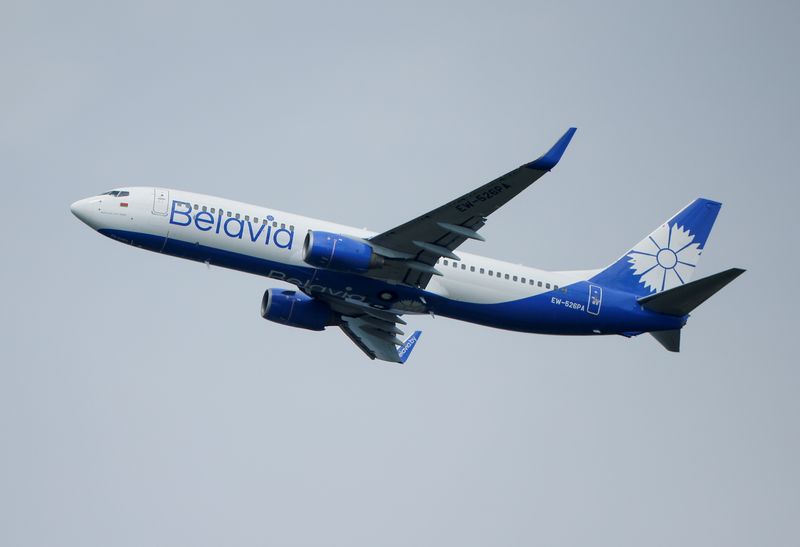By Gleb Stolyarov and Tom Balmforth
MOSCOW (Reuters) - The international response to the grounding of a Ryanair jet in Belarus and arrest of a dissident on the flight has delivered a heavy blow to state-run airline Belavia and its expansion plans.
Only last month Belavia took delivery of a new Boeing (NYSE:BA) 737 MAX as part of its strategy to offer more transit flights via Belarusian capital Minsk.
Since the forced landing of Sunday's flight in Minsk, most of Belarus's neighbours and many other European nations have banned its flights. The EU has proposed closing its airspace to Belavia and stopping it from landing at EU airports.
A Belavia plane bound for Barcelona on Thursday was unable to fly out of Belarus because France had banned Belarusian flights over its territory.
Belavia is the only airline in the ex-Soviet economy of 9.5 million people. It was emerging bruised but ambitious from a COVID-19 pandemic that cut its passenger traffic last year to 1.7 million people, down more than 58% from 2019.
This month it reported a 2020 net loss of 92 million roubles ($36 million), against a profit of 68.3 million roubles in 2019, but said it was securing new demand from people travelling to and from Europe via Minsk. It listed routes from Vilnius to Amsterdam, Frankfurt, Paris and London.
All those routes are now closed.
Belavia says it has been banned from flying to Lithuania, Latvia, Poland, the Czech Republic, France, Sweden, Finland, Austria, Italy, Spain, Germany, Belgium, Netherlands and the United Kingdom. The list could grow.
On Friday Ukraine announced it would ban Belarusian aviation from its airspace.
The Belarusian capital has become a popular transit stop for Ukrainians and Russians travelling between their nations since direct flights were banned after their relations plunged into acrimony in 2014.
SIGNIFICANT DEBT
Belavia accrued significant debts as it built up its fleet of 30 planes, half of which are leased.
At the end of last year Belavia reported total debt of about $400 million, including leasing obligations of more than $220 million. Part of those obligations are with Air Lease (NYSE:AL) Corporation (ALC), having signed a contract in July 2018 for five Boeing 737 MAX jets.
ALC was not immediately available for comment.
"The company is facing very difficult times," Oleg Panteleev, head of Russian aviation analysis agency Aviaport, said of Belavia.
Belavia, which was founded in 1996 two years after authoritarian President Alexander Lukashenko came to power, employed 2,100 people at the end of 2020.
The carrier will almost certainly have to make large-scale cost cuts, including its staff and fleet, Panteleev said.
"On the other hand, Belarus will not abandon its national carrier," he said, suggesting the government could step in with support.
Belavia on Wednesday said that there were no plans for mass layoffs, but it acknowledged that cost cuts and an "optimising" of staffing levels are unpleasant but necessary steps.
The head of Belavia has exchanged emails about the Minsk incident with international airline body IATA, of which Belavia is a member.

"Nobody has suggested they (Belavia) were in any way involved in this," IATA Director General Willie Walsh told Reuters.
"I've made clear that we condemn what the government of Belarus has done. For the hard-working people at the airline, I think you do have to have some sympathy because they didn't do anything, but they are suffering as a result."